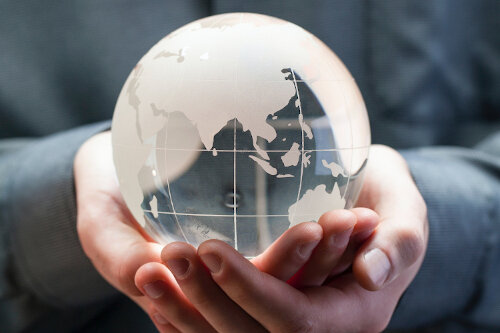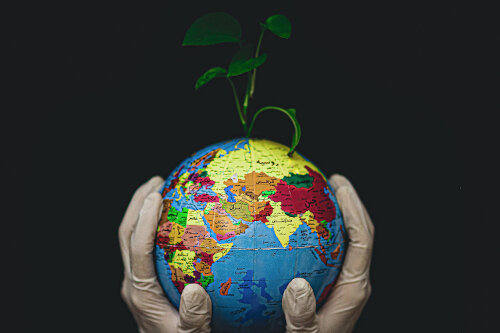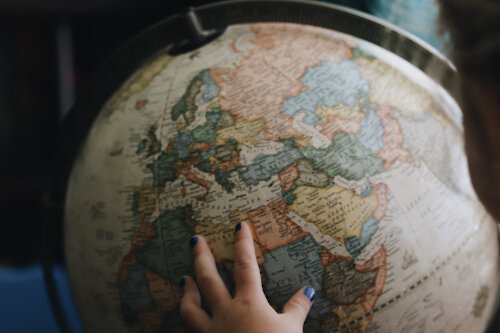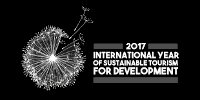Travel after Coronavirus Covid-19 Lockdown: A More Sustainable "New Normal"?
/What does Covid19 Coronavirus mean for future travel and tourism? A UK government survey has found that only 9% of Britons want life to return to 'normal' once lockdown is over. People have noticed significant changes including cleaner air, more wildlife and stronger communities. They are increasingly aware that the health of people and planet are inseparable and it's time for radical environmental, social, political and economic change.
This is it. What, in responsible tourism, ethical business, and more spiritual circles, has been talked about for years. The Tipping Point. The potential paradigm shift. We are actually where we’ve wanted to be. What happens now?!
Is coronavirus a coincidence? No, whichever way we look at it, whether consumption or conspiracy, Covid-19 is man-made. We have created it and the conditions for it to spread.
Now, the world needs a break. The hamster wheel stopped.
Has one issue ever affected the so much of the world so much at once? Whoever we are, wherever we are, we’ve all been locked down: a more level playing field than ever before, globally.
It’s indiscriminate. We’re all vulnerable (though some – those at the bottom of the pyramid – more than others). And like all traumas and vulnerability, we can choose to shrink from it, or grow from it: to paraphrase Rumi, ‘The light is through the wound’.
We need to take Responsibility for this global trauma: Respons-ability – the ability to respond. The question is, how will we?
We can choose to try and return to ‘normal’ and buckle to the rat race, life at breakneck speed, the advertising, the ‘stuff’, the ‘noise’...
Or we can take this opportunity to choose to leave behind what we’ve learnt we don’t like or miss, and take up the new potential: Evolve as nature does and start a whole new cycle, with better versions of ourselves, of our lives. More simple and satisfying, healthier and happier:
Better connection: We’ve found that take away the commute, and we get community. Empathy, kindness, of doorstop deliveries of run-out eggs, & the welcoming warmth of the neighbourhood Whatsapp.
Better tranquility: Hearing the birdsong, seeing wildlife return to quiet streets. Heck, I’ve even lived next to a children’s school farm for years and didn’t know. Now I wake to the baas of sheep!
Better views: The drop in pollution in cities worldwide, never-before-seen skies without contrails.
Better value: Of keyworkers, so desperately underpaid for so long. Of our lifestyles. Of freedom.
Better travel: Will the impossibility of travel make us value it, and its workers, more? Or will we return to ‘before’? Will we not only continue to support the vulnerable, but extend that to holiday destinations’ poor? Will we all come to value tourism not for its frivolous leisure or at best contribution to economy, but for its powerful regenerative abilities in sustainable development?
We don’t need new bucket lists, we just need to turn tourism to deliver on existing Global Goals. We can foresee three phases:
The Short Haul
At first, we’ll see the result of forced behaviour change, but which could bounce back as soon as safe to do so:
Health (SDG3) will be the priority, with our focus will be on awareness, on the physical and on the local.
We’ll be happy to be at home, travelling locally or later domestically, conscious of social distancing – weekends of overtourism crowds or cruise quite repulsive – as we turn to spatial rural escapes - great for more sustainable tourism.
Visitors to cities (SDG11) will be more local, supporting excursions and activities, but accommodation will face less demand (meaning some great deals), and more cleaning. With unknown health and safety standards and less demand, AirBnBs will turn back to local housing stock, no longer adding to inflationary pressures.
More airline check-ins will follow Emirates with pre-flight virus tests, paving the way for routes to open up – though demand will take a big hit for a long time yet – by when a vaccine certificate like yellow fever may become the most valuable ‘passport’ ever.
Facemasks will be normal travelling around, even obligatory in places, no longer the preserve of Japanese, Chinese and Koreans. The Naomi Campbell obsession anti-bac wiping airplane seats in latex gloves will be an acceptable norm, and likely require spare seats per person for physical distancing - and having to get used to consequential higher pricing (which would prepare us for a potential future carbon tax).
We’ll probably be using more water (SDG6) washing our hands – in drought destinations its value will take on a whole new level.
With travel reducing operations, jobs and the sector, demand may even outstrip supply, making holidays rare commodities. Depending on lockdown let-loose timing with school holidays, few may have the opportunity to go far for long, or indeed the money with insecurity in the economy and jobs (SDG8). Few will be better off, but may appreciate the quality of life lessons learned from time at home, possibly bringing more gender equality (SDG5) where both parents home-school (SDG4) and work.
We won’t be so keen to get back to inflexible working or jump on public transport, preferring private vehicles and less travel, potentially creating lower pollution, energy use (SDG7), and carbon emissions, thus support for sustainable consumption and production (SDG12) and conservation of our environment - marine (SDG14) and land (SDG15).
However, the sharpest decline conceivable (5.5% global output in 2020) is still not be enough to meet our Paris Agreement targets (7.6% global output required, annually), highlighting just how far we have to go to improve our world faced with the climate crisis (SDG13).
On the surface, we’ll have more Peace (SDG16), a pre-requisite for tourism, for its recovery, but we’ll feel insecure: We’ll be sure to better check our insurance for pandemic and lockdown cover at short notice.
The Medium Haul
When lockdown lifts, at our different points in the curve, we might see the sprouting of actual attitude change for longer term behaviour change, even though we can travel again further for longer.
It takes anywhere from 18 days to 254 days for people to form a new daily habit, and on average 66 days before a new behaviour becomes automatic (Lally, 2009). So with lockdowns for more than 2 months, daily home rituals can become habit and cause us to change our behaviour and lifestyles.
Those who business travel may finally realise it is just not worth the faff for a day or more when you can Zoom from home for an hour or so – we can live without travel for face to face meetings. Great for our environment!
But we perhaps won’t leisure travel as frequently. Without forming new habits, will we just go back to exactly how we behaved before as soon as we can? Possibly. Except the same suppliers might not be available, and pain avoidance (virus and life trauma) may be a greater incentive for different choices.
The travel landscape is likely to look different, with companies creating new partnerships (SDG17) in order to survive as we struggle to rebuild the sector and demand.
Some of these may be with destination NGOs, keen to support those less fortunate than ourselves, with even less resources to cope. We might not have been able to get all foods on the shelves we do normally, but we can live without many. We’ll be more considerate of communities who ordinarily don’t have easy access to food, or zero hunger (SDG2).
As travel companies promote campaigns to support destinations impacted, we’ll become more aware of the importance of travel to local communities, and desire to help. When we realise we can do this just by having a great holiday and making the right, sustainable, positive impact travel choices we will be more inclined to do so.
This happened with Hurricane Katrina and the Asian Tsunami – the increase in demand to hands-on support drove the voluntourism market to rocket. Likewise, it will be the adventurous who start, then develop into mainstream consciousness, and we’ll have to keep an eye out for greenwashing and ensure there is legitimacy to any claims that holidays contribute anti-corona.
The Long Haul
In the long term, we’ll see full return to global tourism infrastructure (SDG9) – airlines & routes, borders open, international travel demand back when it is safe and secure for people to do so.
But in the medium term meantime, the supply infrastructure is likely to have changed with company liquidity and monetisation priorities, and demand may have changed its priorities thus attitudes and behaviour.
We could end up at a very different point of intersection of supply and demand, both supporting a more giving travel sector, compassionate to health, inequalities (SDG10), and poverty (SDG1).
What if all travel supported sustainable development?
To return to previous normal is to return to unsustainable.
But what do we want from holidays? According to UK research firm BDRC, consumers feel ‘excited’ and ‘happy’ at the prospect ‘to relax’, ‘spend quality time loved ones’, or ‘experience something new’, and the top five infuences for overseas holiday choices are:
1. Weather
2. Price
3. Safety
4. Scenery and Landscape
5. Friendly people
Without considerations for community, climate, and conservation of nature, cornerstones of sustainability, where would we be with any of those?
Maybe it’s time we all starting measuring travel and tourism, not in GDP, but, like Bhutan in GNH - Gross National Happiness, or like Costa Rica, in Social Progress, or like New Zealand in Happiness and Well-Being?
The new normal has to be sustainable and positive impact.
